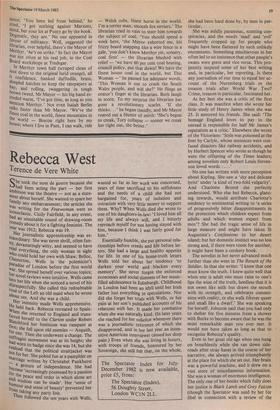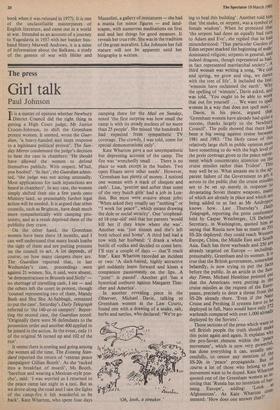Rebecca West
Terence de Vere White
She took the nom de guerre because she had been acting the part — her first ambition was the theatre — not as a state- ment about herself. She wanted to spare her farnilY any embarrassment; the articles she was writing for the Free woman were so Iconoclastic. Cicily Fairfield, in any event, had an unsuitable sound of drawing-room comedy about it for a fighting feminist. The Year was 1912; Rebecca was 19. Her journalistic apprenticeship was ex- traordinary. She was never shrill, often fun- nY, devastatingly witty, and seemed to have read everything, the only woman in sight Who could hold her own with Shaw, Belloc, Chesterton, Wells in the polemicist's Paradise of London before the first world ,war. She spread herself over various topics; ner novel reviews were intuitive. Wells came Into her life when she noticed a novel of his disrespectfully. She called this redoubtable roué of the Left an old maid when he wrote about sex. And she was a child. Her intensity made Wells apprehensive. He held back. Rebecca retreated to Spain. When she returned to England and trans- ferred herself to the Clarion under Robert Blatchford her feminism was rampant at first; she fell upon old enemies — Asquith, for one. Then she underwent a change. The suffragist movement was at its height; she had Worn its badge since she was 14, but she realised that the political straitjacket was not for her. She poked fun at a pamphlet on marriage written by Christabel Pankhurst a gesture of independence. She had become 'increasingly possessed by a passion for the peace and order in which alone art and wisdom can be made'. Her 'sense of humour and sense of beauty' prevented her from taking any party line.
Then followed the ten years with Wells, wasted so far as her work was concerned, years of time sacrificed to his selfishness and the needs of a child she had not bargained for, years of isolation and ostracism with very little money to support them. Why? When Wells died she wrote to one of his daughters-in-law: 'I loved him all my life and always will, and I bitterly reproach myself for not having stayed with him, because I think I was fairly good for him.'
Essentially humble, she put personal rela- tionships before creeds and life before let- ters. She had a large and healthy appetite for life. In one of his home-truth letters Wells told her about her tendency 'to darken your world and blacken every memory'. She never forgot the enforced economies and social dimness of her music- filled adolescence in Edinburgh. Childhood in London had been an idyll until her Irish father lost everything in speculations. Nor did she forget her trials with Wells, or her pain at her son's published accounts of his relations with her. It made her combative when she was naturally kind. (In later years she reached for her solicitor whenever there was a journalistic reference of which she disapproved, and in her last year an insen- sitive American interviewer caused her deep pain.) Even when she was living in luxury, with troops of friends, honoured by her Sovereign, she still felt that, on the whole,
she had been hard done by, by men in par- ticular.
She was mildly paranoiac, scenting con- spiracies, and the words 'mad' and 'evil' frequently cropped up for people who might have been flattered by such unlikely encomiums. Something mischievous in her often led to an insistence that other people's swans were geese and vice versa. This pro- pensity inspired some of her best writing and, in particular, her reporting. Is there any journalism of our time to equal her ac- count of the Nuremberg trials or the treason trials after World War Two? Crime, treason in particular, fascinated her.
At her best she was a critic of the first class. It was manifest when she wrote her little study of Henry James when she was 25. It annoyed his friends. She said: 'The homage England loves to pay to the unread is responsible for half Mr James's reputation as a critic.' Elsewhere she wrote of the Victorians: 'Style was poisoned at the font by Carlyle, whose sentences were con- fused disasters like railway accidents, and by Herbert Spencer who wrote as though he were the offspring of the Times leaders; among novelists only Robert Louis Steven- son loved words .... '
No one has written with more perception about Kipling. She saw a 'shy and delicate lyrist' under 'a kind of two-fold vulgarity'. And Charlotte Bronte she perfectly understood. Who else but Rebecca, glanc- ing inwards, would attribute Charlotte's tendency to sentimental writing to 'a series of progressively bitter disappointments in the protection which children expect from adults and which women expect from men'? She had the tragic sense of life in large measure and might have taken St Augustine's Confessions to her desert island; but her domestic instinct was no less strong and, if there were room for another, it might have been a cookery book.
The novelist in her never advanced much further than she went in The Return of the Soldier. In that she writes: 'I knew that one must know the truth. I knew quite well that when one is adult one must raise to one's lips the wine of the truth, heedless that it is not sweet like milk but draws the mouth with its strength, and celebrates commu- nion with reality, or else walk fOrever queer and small like a dwarf.' She was speaking for herself. Johnson said that you had only to shelter for five minutes from a shower with Burke to become aware that he was the most remarkable man you ever met. It would not have taken as long as that to recognise Rebecca's quality.
Even in her great old age when one hung on breathlessly while she ran down side- roads after stray hares in the course of her narrative, she always arrived.triumphantly at the place for which she set out. Her brain was a powerful machine, and it drew on a vast store of miscellaneous information. She was a woman of enormous intelligence. The only one of her books which fully does her justice is Black Lamb and Grey Falcon (though the Spectator was sued by her for libel in connection with a review of the book when it was reissued in 1977). It is one of the unclassifiable masterpieces of English literature, and came out in a world at war. Intended as an account of a journey to Yugoslavia in 1937 with her banker hus- band Henry Maxwell Andrews, it is a mine of information about the Balkans, a study of the genesis of war with Hitler and
Mussolini, a gallery of miniatures — she had a mania for minor figures — and land- scapes, with numerous meditations on first and and last things for good measure. It reveals her true role. She was in the tradition of the great moralists. Like Johnson her full stature will not be apparent until her biography is written.











































 Previous page
Previous page